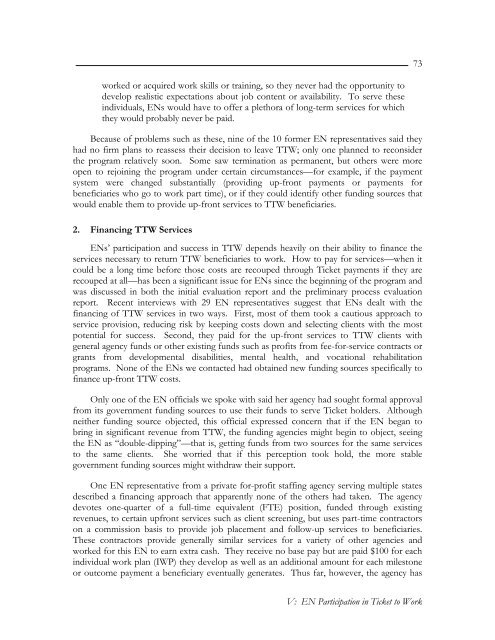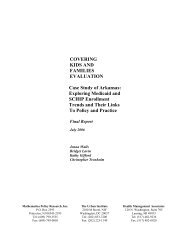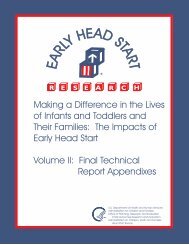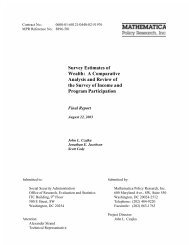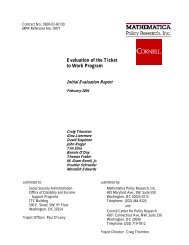Evaluation of the Ticket to Work Program, Implementation ...
Evaluation of the Ticket to Work Program, Implementation ...
Evaluation of the Ticket to Work Program, Implementation ...
You also want an ePaper? Increase the reach of your titles
YUMPU automatically turns print PDFs into web optimized ePapers that Google loves.
73worked or acquired work skills or training, so <strong>the</strong>y never had <strong>the</strong> opportunity <strong>to</strong>develop realistic expectations about job content or availability. To serve <strong>the</strong>seindividuals, ENs would have <strong>to</strong> <strong>of</strong>fer a plethora <strong>of</strong> long-term services for which<strong>the</strong>y would probably never be paid.Because <strong>of</strong> problems such as <strong>the</strong>se, nine <strong>of</strong> <strong>the</strong> 10 former EN representatives said <strong>the</strong>yhad no firm plans <strong>to</strong> reassess <strong>the</strong>ir decision <strong>to</strong> leave TTW; only one planned <strong>to</strong> reconsider<strong>the</strong> program relatively soon. Some saw termination as permanent, but o<strong>the</strong>rs were moreopen <strong>to</strong> rejoining <strong>the</strong> program under certain circumstances—for example, if <strong>the</strong> paymentsystem were changed substantially (providing up-front payments or payments forbeneficiaries who go <strong>to</strong> work part time), or if <strong>the</strong>y could identify o<strong>the</strong>r funding sources thatwould enable <strong>the</strong>m <strong>to</strong> provide up-front services <strong>to</strong> TTW beneficiaries.2. Financing TTW ServicesENs’ participation and success in TTW depends heavily on <strong>the</strong>ir ability <strong>to</strong> finance <strong>the</strong>services necessary <strong>to</strong> return TTW beneficiaries <strong>to</strong> work. How <strong>to</strong> pay for services—when itcould be a long time before those costs are recouped through <strong>Ticket</strong> payments if <strong>the</strong>y arerecouped at all—has been a significant issue for ENs since <strong>the</strong> beginning <strong>of</strong> <strong>the</strong> program andwas discussed in both <strong>the</strong> initial evaluation report and <strong>the</strong> preliminary process evaluationreport. Recent interviews with 29 EN representatives suggest that ENs dealt with <strong>the</strong>financing <strong>of</strong> TTW services in two ways. First, most <strong>of</strong> <strong>the</strong>m <strong>to</strong>ok a cautious approach <strong>to</strong>service provision, reducing risk by keeping costs down and selecting clients with <strong>the</strong> mostpotential for success. Second, <strong>the</strong>y paid for <strong>the</strong> up-front services <strong>to</strong> TTW clients withgeneral agency funds or o<strong>the</strong>r existing funds such as pr<strong>of</strong>its from fee-for-service contracts orgrants from developmental disabilities, mental health, and vocational rehabilitationprograms. None <strong>of</strong> <strong>the</strong> ENs we contacted had obtained new funding sources specifically t<strong>of</strong>inance up-front TTW costs.Only one <strong>of</strong> <strong>the</strong> EN <strong>of</strong>ficials we spoke with said her agency had sought formal approvalfrom its government funding sources <strong>to</strong> use <strong>the</strong>ir funds <strong>to</strong> serve <strong>Ticket</strong> holders. Althoughnei<strong>the</strong>r funding source objected, this <strong>of</strong>ficial expressed concern that if <strong>the</strong> EN began <strong>to</strong>bring in significant revenue from TTW, <strong>the</strong> funding agencies might begin <strong>to</strong> object, seeing<strong>the</strong> EN as “double-dipping”—that is, getting funds from two sources for <strong>the</strong> same services<strong>to</strong> <strong>the</strong> same clients. She worried that if this perception <strong>to</strong>ok hold, <strong>the</strong> more stablegovernment funding sources might withdraw <strong>the</strong>ir support.One EN representative from a private for-pr<strong>of</strong>it staffing agency serving multiple statesdescribed a financing approach that apparently none <strong>of</strong> <strong>the</strong> o<strong>the</strong>rs had taken. The agencydevotes one-quarter <strong>of</strong> a full-time equivalent (FTE) position, funded through existingrevenues, <strong>to</strong> certain upfront services such as client screening, but uses part-time contrac<strong>to</strong>rson a commission basis <strong>to</strong> provide job placement and follow-up services <strong>to</strong> beneficiaries.These contrac<strong>to</strong>rs provide generally similar services for a variety <strong>of</strong> o<strong>the</strong>r agencies andworked for this EN <strong>to</strong> earn extra cash. They receive no base pay but are paid $100 for eachindividual work plan (IWP) <strong>the</strong>y develop as well as an additional amount for each miles<strong>to</strong>neor outcome payment a beneficiary eventually generates. Thus far, however, <strong>the</strong> agency hasV: EN Participation in <strong>Ticket</strong> <strong>to</strong> <strong>Work</strong>


